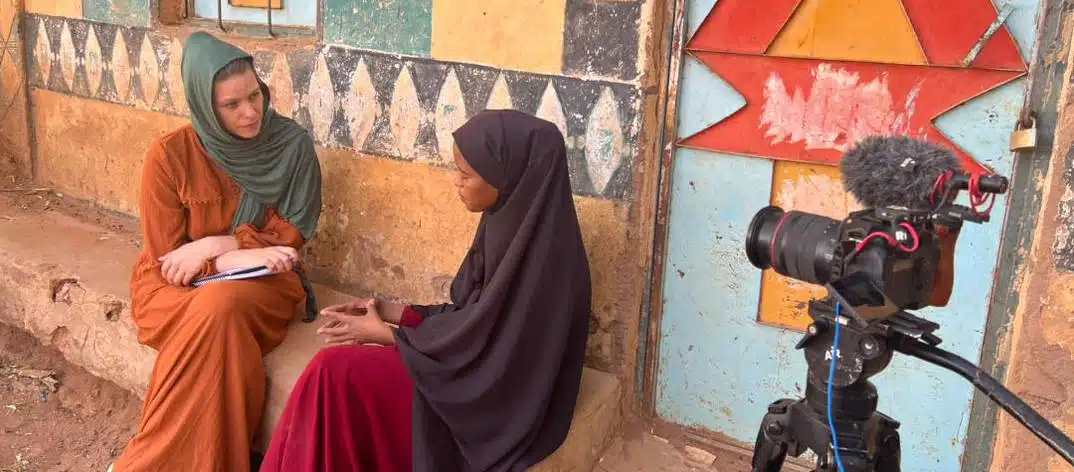Media Centre - Media release - 24 March 2023
As new study finds an additional 43,000 people in Somalia died last year due to hunger crisis, Australian Government must step up famine funding to save lives

Plan International Australia is urging the Australian Government to significantly increase funding towards the global hunger crisis, as the humanitarian situation in Somalia deteriorates even further. The child rights organisation, together with leaders from the Somali diaspora community and a coalition of humanitarian organisations in Canberra this week, has stressed the urgency around calls for a $110 million famine prevention package.
Drought- and conflict-stricken Somalia is on the edge of famine, and although humanitarian agencies are racing against the clock to prevent it, an unprecedented sixth failed rainy season is looming and an official famine declaration is still forecast between April and June this year.
New data released by Somalia’s Federal Ministry of Health & Human Services and the World Health Organization this week found that the hunger crisis led to 43,000 additional deaths in Somalia in 2022, with half of those children under five. Over 34,000 deaths are projected to occur in the first of 2023 – 135 deaths every day.
A new poll undertaken in Australia has found that the majority of Australian voters are shocked by scenes of the hunger crisis overseas and want to see the Government take more action to stop this crisis from worsening.
The YouGov poll of 1055 voters – commissioned by the Help Fight Famine coalition, of which Plan International Australia is a member – found that despite the domestic impacts of the pandemic, the cost of living crisis and the pressures brought about by skyrocketing interest rates and inflation, 65% of people support an increase to funding for famine in the Horn of Africa. Of that number, 27% believe the amount should be $5.70 per person, or $150 million, 38% thought Australia should pledge approximately $1.50 per Australian or $40 million. Just 16% of respondents felt Australia should not pledge any amount. Support more generally for foreign aid has increased to 60%, up from 52% in 2019, prior to Covid-19.
The call follows last night’s episode of the ABC’s acclaimed Foreign Correspondent program, which took viewers to Somalia and the hunger crisis that is rapidly deteriorating across the country. Reporter Stephanie March and videographer Matthew Davis travelled with the Plan International Somalia team across some of the most devastated regions in Somaliland, getting a first-hand look at what day-to-day survival is really like for families – and in particular, for girls.
In the village of Haroshiekh, they spent time with Hinda, an adolescent girl Plan International provides aid to, and her family. Hinda’s father is a livestock farmer, but with water almost non-existent and livestock left with nothing to eat, he is struggling to put food on the table for his family. In the month since the episode was filmed, a further half of his livestock have perished due to the drought. Hinda’s mother tragically died in childbirth last year; her father believes severe malnourishment was a contributing factor. Pressure was then put on Hinda to leave school and manage the household. With Plan International’s support of emergency cash vouchers, water and school supplies, Hinda has been able to return to school and her father has been able to purchase food.
Hinda’s story is not uncommon. When food is scarce, girls often eat less and they eat last. In times of crisis, they are more likely than boys to be taken out of school to help find food, to face gender-based violence or to be married early to reduce the number of mouths their families need to feed.
Plan International research has found that in Somalia, gender-based violence is on the rise: 50% of women were subjected to intimate partner violence in the first quarter of 2022, compared with 43% in the same period in 2021 . The crisis is also placing girls at risk of early, child and forced marriage, gender-based violence, sexual exploitation and abuse. A third (34%) of people that we surveyed in the Sool, Sanaag and Togdheer regions of Somaliland in 2022 believed security risks to girls and women had increased as a result of the drought .
A third (30%) indicated they knew of a girl or woman who has survived sexual or gender-based violence in the last six months, a figure which is likely to be a conservative estimate given the stigma and taboo associated with disclosing sexual violence.
Girls and women also face a daily struggle for survival as they are forced to travel up to 25km in search of scarce drinking water, often at night, putting them at risk of sexual and physical violence.
“Nothing is more painful than for a mother to watch helplessly as her child is starving,” said Plan International Somalia Head of Mission Sadia Allin.
“Every week, I meet mothers who have barely a single grain to feed their children and have resorted to boiling water so the child will think they have a meal. Some of these children have a meal at school, but when they come home they are starving. The mother will keep the pot of water boiling until eventually, the children fall asleep of exhaustion. I often meet parents who have married their daughters, some as young as 14 years old, in exchange for help.
“These human stories of survival are incredibly difficult and emotional to watch. However, despite the pressures of the humanitarian crisis, I am often in awe of the resilience and sense of hope and community from the women and girls here. There is still so much work to do, but we can beat this crisis by working together as a global community.
“We can all make a choice, a moral choice. We can put pressure on the global community and world leaders to take action. Because unless we act starvation will kill — just as surely as bullets and bombs kill in Ukraine. Inaction today will cost one life every 40 seconds, and will be an unforgiven scar on humanity,” she said.
This week, the Help Fight Famine campaign, a collaborative effort bringing together a number of Australian foreign aid organistations such as Plan International Australia, released a new budget paper alongside prominent leaders of the diaspora community. The Urgent Case to Save Lives at a Time of Polycrisis, launched at Parliament on Monday recommends a further $110 million in a Famine Prevention Package to stop a catastrophe in the worst-affected hunger hotspots in the Horn of Africa, Yemen, Afghanistan and Syria.
It also recommends raising the annual allocation of the Humanitarian Emergency Fund to $300 million
and investing $200 million annually in a Global Food Security Strategy to fight the root causes of hunger. It also calls for a commitment to raise the aid budget to 0.5% of GNI and for this target to be locked in legislation, as a matter of urgency.
Australia’s humanitarian funding decreased 34% between 2010 and 2022, while the UK, Japan, US and New Zealand increased their funding between 167% and 346%.
Media contacts


